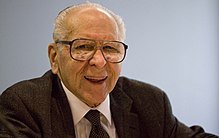Thomas Szasz
| Thomas Stephen Szasz | |
|---|---|

Thomas Szasz
|
|
| Native name | Szász Tamás István |
| Born |
April 15, 1920 Budapest, Kingdom of Hungary |
| Died | September 8, 2012 (aged 92) Manlius, New York, U.S. |
| Citizenship | Hungary, United States |
| Fields | Psychiatry |
| Institutions | State University of New York, State University of New York Upstate Medical University, American Association for the Abolition of Involuntary Mental Hospitalization |
| Alma mater | University of Cincinnati |
| Known for | Critique of psychiatry |
| Influences | Karl Kraus |
| Influenced | Ernest Becker |
| Notable awards | the Award for Greatest Public Service Benefiting the Disadvantaged (1974), the Martin Buber Award (1974), the Humanist Laureate Award (1995), the Great Lake Association of Clinical Medicine Patients' Rights Advocate Award (1995), the American Psychological Association Rollo May Award (1998) |
| Spouse | Rosine Loshkajian (m. 1951; died 1971) |
| Children | 2 daughters |
|
Website www |
|
Thomas Stephen Szasz (/ˈsɑːs/ SAHSS; Hungarian: Szász Tamás István; 15 April 1920, Budapest, Hungary – 8 September 2012, Manlius, New York, U.S.) was an American academic, psychiatrist and psychoanalyst. He served for most of his career as professor of psychiatry at the State University of New York Upstate Medical University in Syracuse, New York. A distinguished lifetime fellow of the American Psychiatric Association and a life member of the American Psychoanalytic Association, he was best known as a social critic of the moral and scientific foundations of psychiatry, as what he saw as the social control aims of medicine in modern society, as well as scientism. His books The Myth of Mental Illness (1961) and The Manufacture of Madness (1970) set out some of the arguments most associated with him.
Szasz argued throughout his career that mental illness is a metaphor for human problems in living, and that mental illnesses are not real in the sense that cancers are real. Except for a few identifiable brain diseases, such as Alzheimer's disease, there are “neither biological or chemical tests nor biopsy or necropsy findings for verifying or falsifying DSM diagnoses", i.e., there are no objective methods for detecting the presence or absence of mental illness. Szasz maintained throughout his career that he was not anti-psychiatry but was rather anti-coercive psychiatry. He was a staunch opponent of civil commitment and involuntary psychiatric treatment but believed in, and practiced, psychiatry and psychotherapy between consenting adults.
...
Wikipedia
